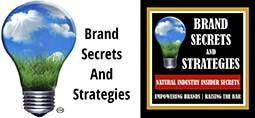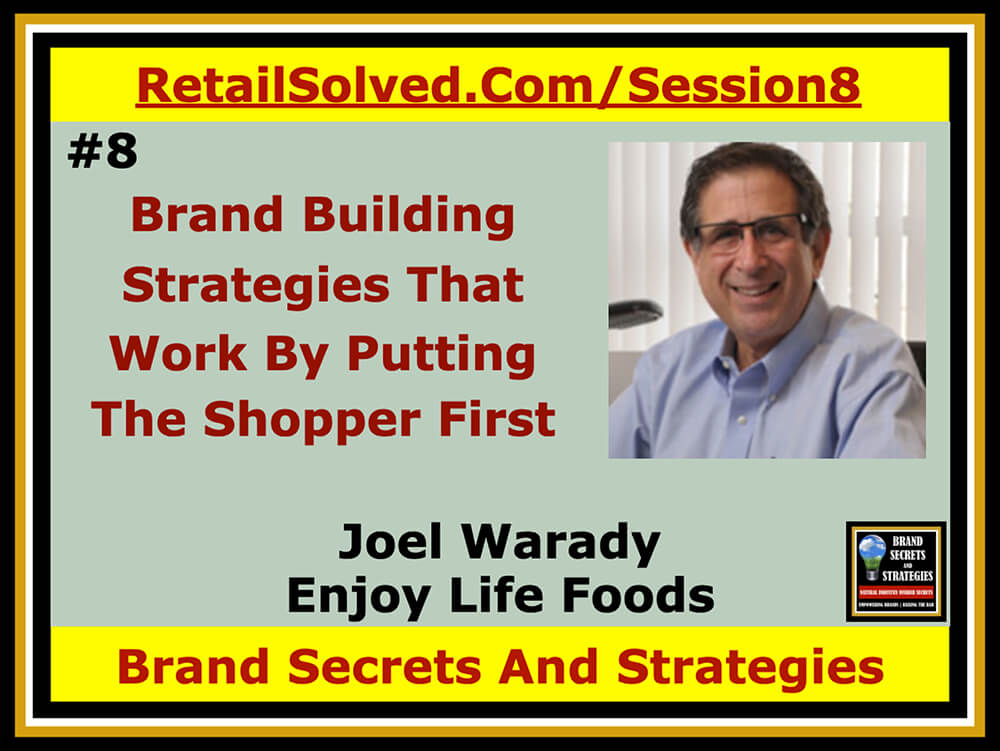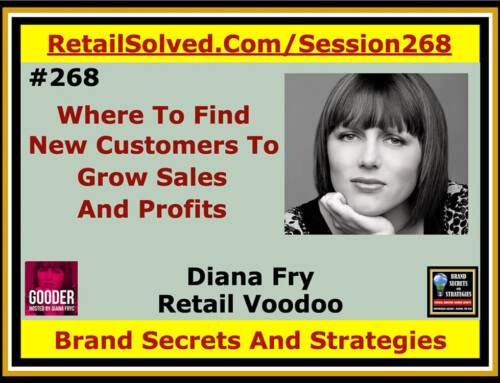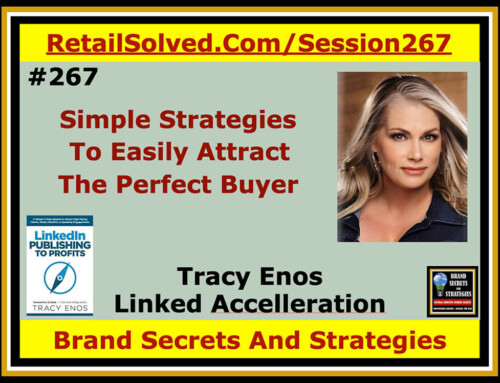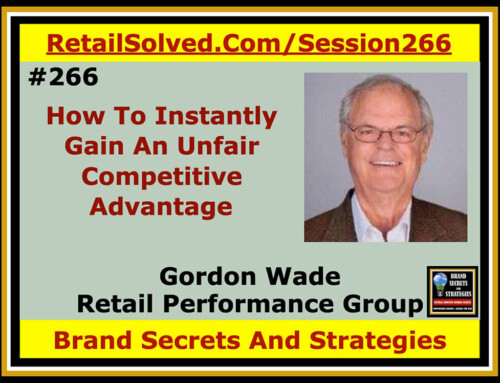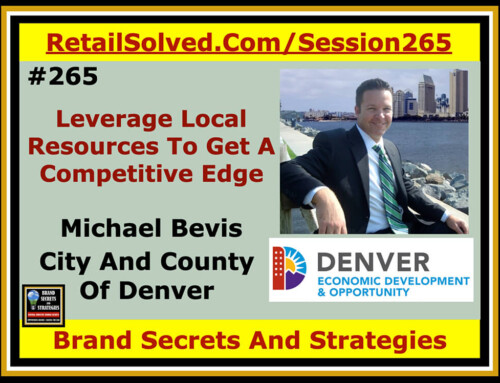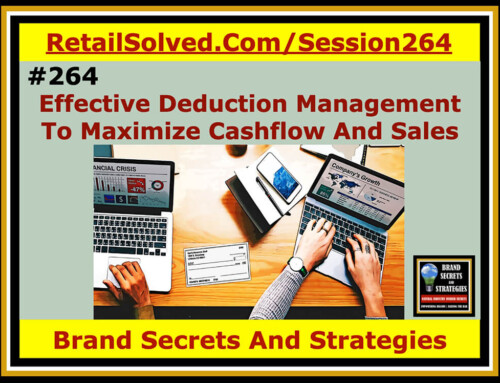Today we're talking about marketing and innovation, two of the key factors that are driving sustainable sales across every channel. More importantly, marketing and innovation, that's how you get your product in the hands of the young consumer. A lot of big brands rely heavily on marketing as the only way that they can communicate the value of their product to the young consumer. Innovation, however, is really where you need to focus. Innovation is developing a product that meets the needs of your core shopper base, and in this episode, we're gonna talk about how the innovating helps drive the marketing.
So, in episode six we talked about the branding and how the message needs to extend beyond the packaging. In episode seven we talked about how to communicate that to the retailer and on the shelf, and in this episode, I'm pleased to introduce you to Joel Warady, who's the Customer Marketing and Innovation Officer for Enjoy Life Foods. Joel is an expert at communicating the value of what's inside the package to the consumers that wanna buy the product. Also, he's an expert in communicating the value of what's inside the product to the retailer.
Enjoy Life Foods made a tremendous gamble, if you will, in trying to meet the needs of future consumers, and as a result carved out a niche, which they're the leader in. Anyhow, without further ado, I'd like to introduce you to Joel Warady of Enjoy Life Foods.
Hello and thank you for joining me today. Today I have the pleasure of introducing you to Joel Warady. The reason I was so thrilled about having Joel on the show today is that he's the key driver in Enjoy Life Foods. He's helped make this brand a mega-brand by communicating directly to the consumers that are looking for free-of foods, and as you know, we talk a lot about this on the show, and I think he's got a great message. More importantly, he's also got a great understanding of social and digital … And the power of using those ways to influence consumers to drive people to your brand. I've also had the pleasure of meeting Joel on several occasions, including listening to him speak at the Category Management Association Show where he shared a deck called “Leveraging Shopper Power Through Social and Digital.” So, Joe, I'd like you to please start with your background, including your humble roots back in Grocery.
Download the show notes below
Click here to learn more about Enjoy Life Foods
BRAND SECRETS AND STRATEGIES PODCAST #8 Hello and thank you for joining us today. This is the Brand Secrets and Strategies Podcast session #8 Welcome to the Brand Secrets and Strategies podcast where the focus is on empowering brands and raising the bar. I’m your host Dan Lohman. This weekly show is dedicated to getting your brand on the shelf and keeping it there. Get ready to learn actionable insights and strategic solutions to grow your brand and save you valuable time and money. LETS ROLL UP OUR SLEEVES AND GET STARTED! Daniel: Hello and thank you for joining me today. Today we're talking about marketing and innovation, two of the key factors that are driving sustainable sales across every channel. More importantly, marketing and innovation, that's how you get your product in the hands of your ideal consumer. A lot of big brands rely heavily on marketing as the only way that they can communicate the value of their product to their consumer. Innovation, however, is really where you need to focus. Innovation is developing a product that meets the needs of your core shopper base, and in this episode, we're going to talk about how the innovating helps drive the marketing. So, in episode six we talked about the branding and how the message needs to extend beyond the packaging. In episode seven we talked about how to communicate that to the retailer and on the shelf, and in this episode, I'm pleased to introduce you to Joel Warady, who's the Customer Marketing and Innovation Officer for Enjoy Life Foods. Joel is an expert at communicating the value of what's inside the package to the consumers that want to buy the product. Also, he's an expert in communicating the value of what's inside the product to the retailer. Enjoy Life Foods made a tremendous gamble, if you will, in trying to meet the needs of future consumers, and as a result carved out a niche, which they're the leader in. Anyhow, without further ado, I'd like to introduce you to Joel Warady of Enjoy Life Foods. Hello and thank you for joining me today. Today I have the pleasure of introducing you to Joel Warady. The reason I was so thrilled about having Joel on the show today is that he's the key driver in Enjoy Life Foods. He's helped make this brand a mega-brand by communicating directly to the consumers that are looking for free-of foods, and as you know, we talk a lot about this on the show, and I think he's got a great message. More importantly, he's also got a great understanding of social and digital ... And the power of using those ways to influence consumers to drive people to your brand. I've also had the pleasure of meeting Joel on several occasions, including listening to him speak at the Category Management Association Show where he shared a deck called "Leveraging Shopper Power Through Social and Digital." So, Joe, I'd like you to please start with your background, including your humble roots back in grocery. Joel: Well, thank you, Daniel, and thanks again for inviting to be on this podcast. So, if you go all the way back to when I was in college, I was a history major, and you can't do a lot with being a history major other than teach, but I put myself through school by working in the supermarket industry for Dominick's, which at the time was the number two chain in Chicago, and really fell in love with the idea of category management and consumer packaged goods. So from Dominick's I went into the financial services world, but I had this love for CPG and left financial services and started a toothbrush company, which ultimately became a dental products company. So we manufactured private label toothbrushes and dental floss and ultimately whitening. I was fortunate enough to sell that company and then started a marketing consulting firm, and my initial clients were all in oral care and health and beauty, but I really wanted to get into the food industry, and so I started to learn about food, going to the food trade shows, and Enjoy Life became one of my clients in the consulting group and joined the board and ultimately joined Enjoy Life full-time in 2011. So, that is a quick overview of my career. Daniel: Can you tell us a little bit about Enjoy Life? And by the way, as a full disclosure, my sister is gluten intolerant, and I don't think a lot of people really understand what that means and why it's important, and where I'm going with this is that when you look at the trends that you guys help lead the way in, in terms of driving gluten-free and allergy free and of course what goes with that is transparency, et cetera ... Can you explain a little bit about Enjoy Life Foods' mission and how you communicate that to your broader audience? Joel: Sure, so going back to the start of Enjoy Life in 2001, we made a decision, and I was involved with the business before it was ever known as Enjoy Life. It was a business plan, and there were other gluten-free companies in the market-place, and gluten-free companies were focused on people with celiac disease or gluten intolerance. That was really the core group, but we decided to differentiate the brand. We needed to do something in addition to being gluten-free, and we found out that the FDA had designated eight allergens, what they call the "top eight." So we made the decision, somewhat naively, to be both gluten-free and free from the top eight, and I say naively because we didn't realize how hard that was going to be. So from day one, in addition to being gluten-free, we're free from dairy, egg, soy, wheat, peanuts, tree nuts, fish, and shellfish. Every one of our products is free from gluten and the top eight. Daniel: That's amazing. In fact, what's interesting is when I used to work for SPINS I was doing some research into the various categories, and I started noticing, I talk about the little ripples in the pond, the little ripples being free from trends and how these trends were starting to grow sustainable sales in every category, and those trends were helping those brands really stand out on the shelf. You said you kind of tripped over it, so to speak, what did you see as the initial stamp of approval from the industry when you started going this way? Was there pushback or were people embracing it right off, and what it did take people to really get on board with what you were doing? Joel: Great question. The reality is when we would go out and talk to the retailers and we would talk about this concept of being allergy friendly, they looked at us with a glazed over look because food allergies just weren't being talked about, and initially what we said is, "Well, just wait. It's coming," but what they said was, "Well, fine. When it comes we'll bring your brand on." So we tweaked our positioning just a little bit, and what we said was, "Well, we're gluten-free, plus ... " If you're going to be putting gluten-free on your shelf, why not put a product line that was gluten-free plus free from the top eight allergens because there are those people out there that have food allergies, and once they saw us as being gluten-free, plus, they said yeah, it makes sense because the others are just gluten-free. That was step one in getting on shelf, but then step two, and this is really what catapulted the brand, is when I joined the company full-time in 2011, I came on board as a chief marketing officer, and what I realized was that everyone was focused on the natural channel. So Whole Foods was absolutely our number one customer, but all of the brands were focused on retailers in the natural channel and what I decided to do was to redirect the brand to focus on the conventional channel as well. So we altered our packaging to look a little bit more mainstream. We went to the conventional retailer and said, "All of the sales that are happening in this category are happening in the natural channel and you're not getting any of it. We're your brand and we will help you get that," and that's really what allowed us to become the leader in the category, when we started to go after the conventional channel without ever alienating the natural channel. Daniel: That's key, and I talk about that a lot, about the importance of making sure that natural remains natural. You continue to help the natural retailer survive and grow and thrive while building out a core base in the conventional or mainstream channel because that introduces more people to our healthy way of life. So Joel, what strategies did you use to help the natural retailers regain and retain their core base and gross sales within their stores, and then how did that differentiate from your go-to-market strategy in mainstream? Joel: Well, one of the things that we did is we were expanding our product line and expanding our flavor varieties. We knew that the conventional retailers only wanted the top six or top eights SKUs, so what we would tell the natural retailer is we would promote within our consumer base that the natural retailer had a larger variety of our product, and so it wasn't necessarily lower velocities, it was just from a space standpoint they were able to commit more space to our brand, so we kept advertising in the natural channel. We continued to focus on it, and then the other thing that we did is we looked at what was important in the natural channel. So, again, just taking some steps backwards ... Prior to 2006, there was no gluten-free certification. People could just say that they were gluten-free. Well, we worked with the Gluten-free Certification Organization to create the standards for being certified gluten-free, and what a lot of people don't realize is that the GFCO, which today certifies 24,000 products in 18 different countries, Enjoy Life was the very first product to ever receive gluten-free certification. We helped set the standard, and so the conventional retailer didn't really care a lot about it, but the natural retailer did. And then we did this thing with non-GMO. We turned all of our product line into non-GMO a lot earlier than most other brands did because it was important to the natural channel. Daniel: Amazing, and that's one of the things I love about the natural channel is the community, the way it rallies behind certain causes, certain ideas, certain themes, to really promote and raise the bar, and just generically speaking, for any of our listeners who really don't understand what it means to be celiac or gluten intolerant, essentially what you're doing is when you're eating food your body is starving. It's not getting the nutrients and it's not digesting or metabolizing the nutrients properly, so you're effectively starving yourself even though you're eating "healthy," and so this is a real thing, gluten-free/intolerant. More importantly ... I mean, a lot of people look at it as a trend or as a fad, and it is a healthy way of life, but for some people, it is the only way of life. It's made a tremendous difference in my sister's life, being able to find gluten-free products. More importantly, finding gluten-free products that taste better than the cardboard box that they come in. Running joke in the industry. So, that's fantastic you were able to do that. So the ability to be able to change the conversation within the market and within the community and within mainstream ... How did you leverage that communication and what you were doing to help educate and bring more people into this new way of thinking? Joel: Education was very important, and we worked with both the retailers as well as key influencers and with the key influencers we were fortunate that social media became very popular during our growth trajectory. So we were able to communicate one-to-one with our consumer utilizing social media platforms. It was really one of the major differences in our growth. Daniel: I talk a lot about this, a lot of the big brands talk at their consumers through traditional marketing and advertising, et cetera ... And yet digital, social and digital media allows brands like your brand to have a one-on-one relationship, just like we're having a conversation today. A couple of the facts that I was really impressed with that you shared at one of your conferences, one of your talks, was that 92% of word-of-mouth happens offline, and 90% of all consumer decisions are made through a positive recommendation from someone they trust. This is key. Can you please share with our audience why that's so relevant and what are some of the ways that anyone listening to this could leverage that methodology, those ideas, to help grow their awareness within their community? Joel: Yes, those two stats that you shared, Daniel, are so important and they haven't changed a lot over the years. The fact is that a lot of information is shared via social media, but where people are talking about what they read on social media is offline. So whether it's a water cooler conversation or a conversation over lunch, that tends to happen offline. So, because we understand that, we provide a lot of information via online, but we give people the opportunity to share that offline, which leads right to the trust factor, and there's probably nothing more important to a brand like Enjoy Life than building trust because we are about keeping people safe, healthy, and in many cases, alive. We know that people don't necessarily trust what brands have to say, but they trust what their peers have to say, so we provide platforms to allow for peer-to-peer recommendations. You mentioned brands talking and using a megaphone, so one of the things we did very early on with Enjoy Life, with our social platforms, is instead of using it as a megaphone we provided a platform to allow our consumers to talk to one another and we acted as a facilitator, and that allowed people to share their testimonial about our product line. Daniel: That is so important. I want to emphasize that again. Allowing consumers to become your voice is so relevant and so important, and I think a lot of companies miss. Retailers don't really care that you're number one or two in the category. They already know that, they don't need you to bring a report in, but if you can bring something to the retailer that shows them tangibly that your voice, your consumer base is the consumer that they want to leverage or drive sales, foot traffic and loyalty in their store, that's the key. You made a comment once to me, and I apologize, I don't remember exactly what it was, about how this converts to shopper loyalty. Can you give our listeners some idea of how you would recommend a brand leveraging these resources, resources meaning human capital, to become a loyal shopper base that you can then take to the retailer to help the retailer compete more effectively? Joel: So, without being trite and using cliché phrases, authenticity is really important, and we've been talking about authentic for the last 16 years. So one of the things that I personally did early on when I joined the company back in 2011, and we were still relatively small. We were doing about $11 million in revenue the year prior to me joining. I had always been on social media, so I was on Twitter and I was on Facebook and I shared my personal cell phone number in the first week, and what I said to every consumer is, "Call me," and they did. And people said to me, offline, they said, "Why would you do that?" And I said, "Why wouldn't you want to talk to your consumer?" It allowed me to create this true one-to-one relationship, and what I found was that to build that loyalty, while I didn't have to talk to everybody, the people that I did talk to shared with others that they were able to talk to Joel, or the CMO, and where that became really important was in February of 2015 we made the decision to be acquired by Mondelez, and as you can imagine, a lot of our loyal consumers were concerned. Mondelez was not considered a natural company and they certainly weren't considered a company that was focused on food allergies, so there was a real concern, but we anticipated it and after the first couple hours of people hearing that we had been acquired I went online and again, posted my mobile phone number and said, "If you have an issue, call me. I'm not going anywhere," and what we found is within 48 hours our loyal consumers were defending Enjoy Life. We didn't have to defend ourselves, they did it for us, and that was exactly what we wanted to do. Daniel: That's amazing. There are so many stories I've heard about how a big brand takes over or acquires a small, natural brand and ruins them, and I've got to say, I've watched you guys mature from back in your early days even through today, and I don't get that big brand feeling that you get from some brands. I still get that very intimate, as you said, authentic, perception. I still see that within your brand, and the fact that you've been able to keep that relevant throughout the transition and beyond is amazing. Has it really helped your sales being able to have ... I mean, I wasn't planning on talking about this, but to have the backing of a big company behind you, how has that impacted you in the sense that you've been able to stay true to who you are and yet have someone to help you get some more runway? Joel: You're right that we've been able to maintain our authenticity and I give all the credit to Mondelez. One of the things that we discussed when we were being acquired was for it to be a good fit we needed to operate independently but tap into their resources when we needed it. We're two and a half years into the acquisition, and they have held true to their word. Daniel: Good. Joel: We continue to operate independently, we use our own sales team and our own marketing team. We do all of our own development, but when we need Mondelez expertise they're there for us, and when we need their capital. So a great example of that is we had outgrown our manufacturing facility, our bakery, and we wanted and needed a new bakery, and Mondelez invested over $35 million to allow us to build from the ground up a brand new bakery that's located outside of Louisville, Kentucky, and it's state of the art. It's truly the world's largest allergy-friendly facility and we could not have done that without the backing of a company like Mondelez. Daniel: That's amazing. In fact, at the Category Management Association I had the opportunity to talk to several brands that were looking at getting in to the gluten-free space, and without an exception they were all talking about how unbelievably expensive it was to have a facility certified as gluten-free, because even the slightest little bit of gluten can dramatically, negatively impact a consumer, harm a consumer, if you will. So the fact that you guys were able to build, from scratch, an allergy free facility with their resources and their help and their support is amazing. So how has that helped you then, Joel, impact your sales?. I assume that you are able to better respond to promotions and respond to trends in the category and the industry as a result. Joel: Exactly. From capacity standpoint our capacity is significantly greater, but we also use our facility as part of our marketing tool. Daniel: I like that. Joel: It goes back to trust and loyalty. Nothing says trust more than the fact that we have this state of the art, allergy friendly facility that has never had an allergen inside. So we don't have to worry about doing any clean-out. It has been allergy friendly from day one, and so when we're talking to either retailers or consumers, we emphasize that significantly, that we are the experts in this field. I'll just share an interesting statistic. 50%, five-oh, 50% of all recalls in the United States today are due to an unstated allergen in the product. Well, when you think about Enjoy Life, we don't have any of those allergens in our facility, so we take the recall out of the equation. Daniel: Love that. In fact, actually, I'm surprised that it's only 50% when you think about it. I would assume that the impact would be much greater, and what I think a lot of people don't realize is it's not just a matter of bad press, it's horribly expensive for a brand to retool and pull all the product off the shelf and all the PR nightmares and everything else, so that's pretty smart. What do you see the future of Enjoy Life Foods and the allergy-free trend as far as within the categories that you play? Joel: Well, unfortunately, the incidents of allergens continues to increase. In fact, there was a study that was just released last month that said ... An independent group named FAIR, F-A-I-R, did a study and found that the incidents of food allergies have risen 400% in the last 10 years, and sharing some other quick stats, every three minutes of every day, 365 days a year, someone goes to the emergency room due to a food allergy reaction. So, the CDC has said it has become an epidemic, and it's unfortunate because no one wants to live a life with food allergies, and everyone's working on cures for it, but while it currently exists, we see the market continuing to grow and more and more people are buying products that address food allergies. It's one of the reasons why we continue to expand our product line. We have now over 80 SKUs and we're in seven different categories because the need is there. Daniel: Before we started our conversation, we were talking about what I do and you were asking me some questions, and I told you that I'm a category management expert. I've rebranded a little bit and I use the term now "true category management" to highlight what we're talking about. So what I'm getting at,is that if you look at what's driving sales across literally every single category it's natural, organic products, healthy products, clean label, allergy free products. I wrote an article about this a couple years ago. It was published in the 2016 Category Management Handbook. If you remove those products, organic, et cetera, from mainstream products, from the mainstream categories, they're all down and declining, and so what I'm getting at is that its brands like you that are responsible for driving sustainable sales across every category. It's brands like yours and like what you're talking about that are responsible for not only keeping the consumers healthy, but providing consumers what they want and helping consumers avoid things that could like you said, become allergies and epidemics, et cetera ... So I hope everyone listening understands that this is perhaps not only cutting-edge ... The fact that you guys tripped over it is brilliant, but more importantly, the fact that you guys were able to ride this wave and help take a leadership role in this is key. You mentioned that you're responsible for overseeing innovation and development of new products. We've talked a lot, Joel, about why this is important, so can you share with us why or how you work with your company, in terms of the R&D, and the innovation that you bring in to the category. How do you test it, how do you validate it before you launch it? Joel: Well, over the years our R&D and our innovation have become more sophisticated. Back in 2005, 2006, gluten-free product tasted like cardboard with a little bit of sugar but it was safe, people ate it. Today that's not the case. Today products have to taste great. The other thing that we're looking at is how do we add functionality to our products. So, for instance, a couple years ago we introduced a line of baking mixes that had both shelf stable probiotics and algae protein, and so when we're looking at our R&D we're looking at taste, we're looking at functionality, and we're looking at new and interesting ingredients, things like teff flour that can add some additional protein. And then from a testing standpoint, I will say we still do a lot based on our gut. We talk to our consumers on a regular basis, so focus groups are less important to us because we're talking to our consumers literally every week and hearing what they need in their life. When we're getting close to launching a product we will send the product out for taste testing just to make sure that we're hitting the right taste notes for our consumer. We believe we know our category extremely well and we tend to do a lot based on just our knowledge of the category and our expertise. Daniel: You mentioned focus groups. A lot of big companies rely heavily on focus groups and I can think of a lot of different launches that failed because the focus group said it was great but no one wanted to buy it, and that's key. That brings us back to where we started this conversation about the importance of remaining close to your core consumer. Another thing you've shared is that you monitor customer service feedback to ensure customer retention, and that's key. Can you share a little bit more beyond sharing your phone number, which, by the way, is really cool, that you help manage that? Joel: Sure. So, we put the consumer line within the marketing department, and so when the consumers call in and provide feedback on a product or maybe on packaging, that is shared immediately within the marketing team as well as our QA team. That helps us understand what people are looking for, what might be working within our product lines and what isn't working, so we're constantly monitoring it, whether it's on the phone or via our social media platform or via email. It's not unusual if we get an email complaint or suggestion for me to respond to that email personally and ask for that person's phone number and pick up the phone and have a conversation with them. It is the way that we're always learning as to what our consumers need. Daniel: That's amazing that you do that. Such a hands-on approach. More importantly, the fact that you are actually listening and again, reiterating again and again that the brands that are closely aligned to their end consumer, the brands that are winning on shelf, the brands that are driving sales. Joel, is there anything else that you would like to share, recommendations, thoughts, or ideas, that you would offer someone wanting to get into the natural/organic space, and a brand that's in the space looking to make a sustainable difference? Joel: So I think the key, Daniel, is finding your niche and then stick to it. So I'm going to pull some thoughts together that you commented on related to focus groups. So when you use focus groups, what tends to happen is that brands get diluted because you're taking all of this input from different people and you're trying to please everyone. For brands to succeed, you have to believe in your gut what you're doing is right and don't allow the naysayers to tell you to change the brand or change the packaging. Just do what you think is best. So we did that with our brand and for years people said, "I don't get the whole food allergy thing," and we said, "Just wait," and we got to where we are today, but as we record this, another brand that sticks in my mind and they are friends of mine is RXBAR. Last week Kellogg's announced that they were buying RXBAR for $600 million, a huge number. If you look at what RXBAR is, it's one product line of one type of bar with 12 different flavors, and they just sold it for $600 million. They stuck to exactly what they wanted, and by the way, while I love the bar and I eat one a day, I have met people that said, "I don't like that bar and I would never eat it," and to RXBAR's credit what they said was, "Then we won't go after that consumer who would never eat it. We'll only go after the ones that will," and that's how they built their brand. In five years they went from the basement to a $600 million acquisition, which is pretty amazing. Daniel: That is amazing. Again, remaining true to yourself. Not trying to be a little of something to everybody but being everything to one person. Going back to the innovation question earlier, a lot of brands, the bigger brands, they'll slap a new label or new flavoring on it and they'll call it something that's innovative and new. I've always called the natural channel the R&D department of the CPG industry, and I think what you've said here illustrates that really well in terms of the fact that you're actually listening to your consumer, you're paying attention to what your consumer wants, and you're developing products that meet their needs. Joel, I really appreciate you being on today. Is there anything else that you'd like to share before we wrap up? Joel: No, Daniel. I think you've asked some great questions and hopefully, your listeners have a good feel for how to take their own brand to the next level. Daniel: Great. Well, I appreciate your time. Thank you again and I look forward to meeting you in person, hopefully soon. Joel: Thanks, Daniel. Take care. Daniel: Thanks. Joel: All right, bye-bye. Daniel: Bye. Joel, I want to thank you again for coming on today. You've provided so much great information. The ability to develop a marketing strategy around the innovation that your brand has is the key. This is going to provide tremendous value to anyone listening to it. If you want to learn more about Enjoy Life Foods and get to know Joel even better, then go to enjoylifefoods.com. I'll include a link to their website along with the show notes for this episode at brandsecretsandstrategies.com/session8. Today's free download is Strategic Solutions to Grow Your Brand, so text "strategicsolutions" to 44222 to download your copy immediately, or go to today's show notes. Thank you again for listening, and I look forward to seeing you in the next episode. This episode's FREE downloadable guide This short guide levels the playing field between small brands and their more sophisticated competitors. It highlights the advanced strategies the big brands use called Category Management - what retailers want. CLICK HERE TO DOWNLOAD YOUR FREE STRATEGIC GUIDE: Strategic Solutions To Grow Your Brand Thanks again for joining us today. Make sure to stop over at brandsecretsandstrategies.com for the show notes along with more great brand building articles and resources. Please subscribe to the podcast, leave a review, and recommend it to your friends and colleagues. Sign up today on my website so you don’t miss out on actionable insights and strategic solutions to grow your brand and save you valuable time and money. I appreciate all the positive feedback. Keep your suggestions coming. Until next time, this is Dan Lohman with Brand Secrets and Strategies where the focus is on empowering brands and raising the bar. Enter your name and email address below and I'll send you periodic updates about the podcast. Sign up to receive email updates
Listen where you get your podcast
Like what you’ve heard? Please leave a review on iTunes
FREE Trade Promotion ROI Calculator:
Click Here To Maximize Sales And Profits
Free brand-building resources to help you grow and scale
Turnkey Sales Story Strategies FREE ON-DEMAND COURSE
Why Most Brands Fail – The Roadmap To Sales Success FREE ON-DEMAND COURSE
Essential In-Store Customers First Marketing Strategies FREE ON-DEMAND COURSE
How To Drive Profits With Sustainable Packaging FREE ON-DEMAND COURSE
The Retail Game – What You Need To Know With Bob Burke FREE ON-DEMAND COURSE
Sales Success Begins With A Solid Business Plan FREE ON-DEMAND COURSE
How To Turn Your OnLine Data Into Explosive Sales Growth FREE ON-DEMAND COURSE
2016 Category Management Handbook Page 20 & 21
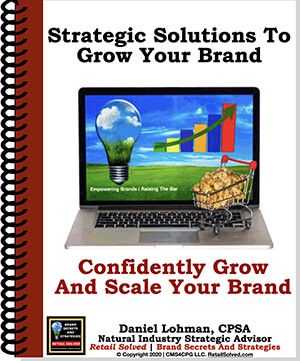
Need Strategic Solutions To Grow Your Brand?
This short guide levels the playing field between small brands and their more sophisticated competitors. It highlights the advanced strategies the big brands use called Category Management – what retailers REALLY want.
Empowering Brands | Raising The Bar
Ever wish you just had a roadmap? Well, now you do!
Don’t miss out on all of these FREE RESOURCES (strategic downloadable guides, podcast episodes, list of questions you need to be asking, and know the answers to, the weekly newsletter, articles, and tips of the week. You will also receive access to quick and easy online courses that teach you how to get your brand on the shelf, expand distribution, understand what retailers REALLY want, and address your most pressing challenges and questions.
All tools that you can use, AT NO CHARGE TO YOU, to save you valuable time and money and grow your sales today!
Image is the property of CMS4CPG LLC, distribution or reproduction is expressively prohibited.
